Thought Leadership Studio Podcast Episodes:
Thought Leadership in Skills-First Hiring with Dr. Mark Smith
Episode 83 - Revolutionizing Talent Acquisition: How Skills-Based Hiring is Transforming Recruitment Practices and Challenging Traditional Hiring Models
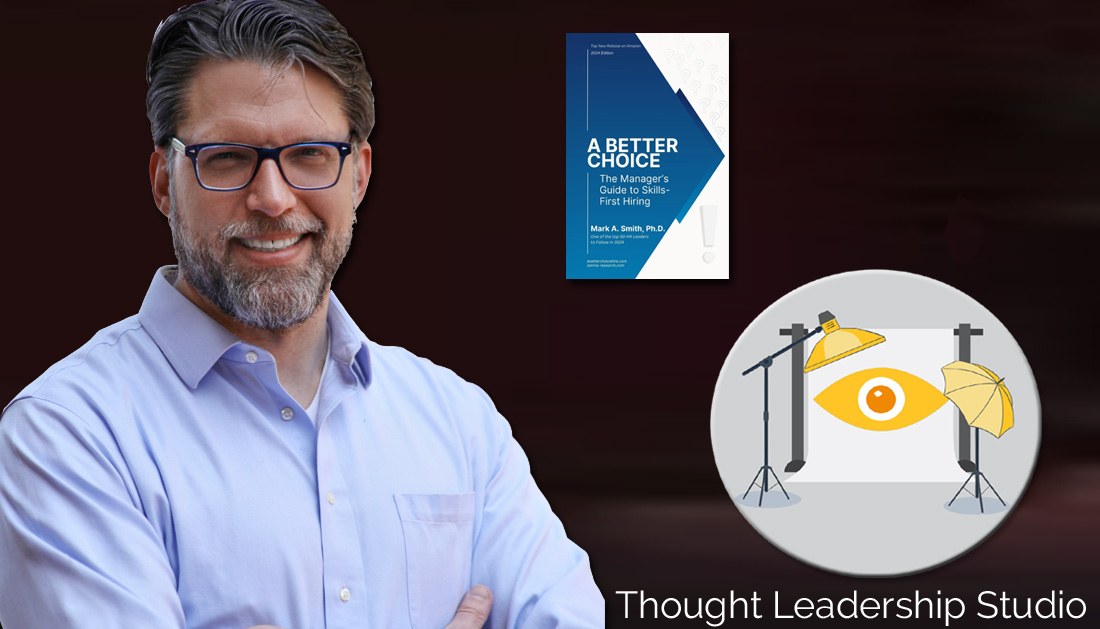
#authors, #hr, #innovation, #interview, #interviews, #leadership, #management, #marketingstrategy, #organizationalculture, #paradigmchange, #paradigmshifts, #thoughtleadership, #thoughtleadershipmodels
Or Click here to listen or subscribe on appWhat this episode will do for you
:- Mark Smith's Journey in Thought Leadership: Learn how Dr. Mark Smith has become a leader in modern HR practices, using skills-first hiring to transform traditional recruitment strategies.
- Insights from "A Better Choice": Dive into key concepts from Dr. Smith’s book, "A Better Choice: The Manager’s Guide to Skills-First Hiring," and understand how it reshapes talent acquisition for a new era.
- AI and Skills-Based Hiring: Discover how AI tools, including computerized assessments, are revolutionizing the hiring process by evaluating skills and knowledge more efficiently than traditional methods.
- Challenges in Implementing Skills-First Hiring: Explore the hurdles companies face when shifting from experience-based hiring to a skills-first model, and how AI can support this transition.
- AI’s Role in Supporting Human Judgment: Understand the balance between AI-driven assessments and human intuition in the hiring process, ensuring that candidates are evaluated holistically.
- Establishing Thought Leadership in HR: Gain insights into how Dr. Smith’s thought leadership has gained bipartisan support and influenced HR practices at a national level, including testimony before Congress.
Mark Smith, Ph.D.
In this episode, I’m excited to introduce Dr. Mark Smith, a pioneer in modern hiring practices.
How does hiring relate to Strategic Thought Leadership (STL)?
STL is about shaping ideas that inspire and lead. In HR, Dr. Smith has demonstrated this can mean evolving beyond traditional hiring models to prioritize what truly matters—skills, knowledge, and the ability to learn.
As principal consultant at A Better Choice, he advocates for skills-first hiring, challenging the outdated focus on education and experience. His book, *A Better Choice: The Manager’s Guide to Skills-First Hiring,* has become a key resource for leaders seeking more effective hiring methods.
Mark has presented his expertise to Congress, gaining bipartisan support for his approach. In this episode, we discuss his unique model of blending computer assessments with role-play evaluations, and how it’s revolutionizing hiring. Mark also shares practical advice for leaders looking to implement these methods.
Some of Dr. Smith's coordinates:
Curated Transcript of Interview with Mark Smith, Ph.D.
The following partial transcript is lightly edited for clarity - the full interview is on audio. Click here to listen.
Chris McNeil: I'm your host Chris McNeil, with Thought Leadership Studio, and I'm sitting here with Mark Smith, PhD, principal consultant at a Better Choice, hire an author of the bestselling book, A Better Choice. The Manager's Guide to Skills, first Hiring Mark's Expertise and HR and Talent Management has earned him recognition as one of the top 50 HR professionals and leaders of 2024 with a PhD in industrial organizational psychology.
He's made significant contributions to hiring practices and HR research, including presenting expert testimony on skills-based hiring to the US House Committee on education and the workforce. Impressive Mark's unique blend of scientific rigor and creative problem solving drives his mission to help companies hire the right people. What a big issue that is that came up after you in the last interview. That's one of the top issues with executives these days. Welcome, Mark. It's great to have you back.
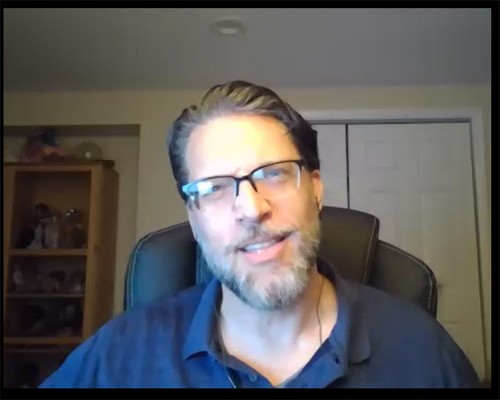 Mark Smith, PhD: Great. Yeah, great to see you, Chris. I was on this a few years ago and lots of things have changed since then and I'm excited to talk about some of them.
Mark Smith, PhD: Great. Yeah, great to see you, Chris. I was on this a few years ago and lots of things have changed since then and I'm excited to talk about some of them.
Revolutionizing Hiring: Skills-First Approaches and the Role of AI
Chris McNeil: Yeah. You've written your book, you're doing independent consulting ...you were director of Thought Leadership and HR at SHRM at that time.
Mark Smith, PhD: That's right, yeah, that's right. And it's funny, I was talking to some folks in the larger thought leadership industry about, well, what does a career in that field, in this field look like? And some of them were just like, oh yeah.
As a writer, I've been in thought leadership for years or as a researcher, but some of us were, we were sort of supporting others in thought leadership, but had some background as where we were going, well, am I supporting somebody else in thought leadership or is that something I should be thinking of myself as? I am a thought leader as well.
And so I'm like, I can only support for so long. At some point you sort of got to write your own book and you got to kind of do your own thing.
Chris McNeil: That's right - you've built a very powerful model that we were talking about before we started recording, one that optimizes the hiring process, and that's a game changer from what I'm understanding and has taken a big load off of the plate.
And we talked a little bit about how AI has created a deluge in some ways of information to be managed, but it takes the human touch at other stages.
Mark Smith, PhD: Yeah, yeah. It's amazing how in the past two years how much AI has advanced in terms of companies planning to use it and starting to use it and trying to use it. A year ago there was still a lot of talk, oh, we need to do this, and oh, we promised that we'll do it. And now companies are starting to do it, but what I'm seeing a lot is they're not necessarily doing it all. Right. And as you say, losing the human touch.
Chris McNeil: That can happen. Well give our readers, our listeners, a little context of where you're coming from now as opposed to a couple of years ago especially. Was there a pivotal moment as something that happened or a shift in your thinking that led you to go off on this independent path, write your book, do this type of work that you're doing now?
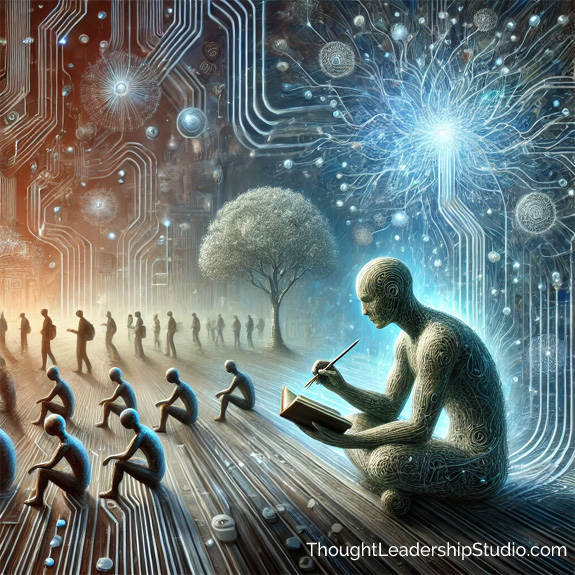 Mark Smith, PhD: So my whole career had really been about hiring and helping companies hire better, and that's really why I went into organizational psychology to begin with. And so when I started in the late nineties and embarked in grad school, it was for the purpose of helping companies assess applicants hire better.
Mark Smith, PhD: So my whole career had really been about hiring and helping companies hire better, and that's really why I went into organizational psychology to begin with. And so when I started in the late nineties and embarked in grad school, it was for the purpose of helping companies assess applicants hire better.
I came from a football background, and the NFL draft was fascinating to me just in terms of how do I determine the best player to pick? And some of the times it was the best player and at other times it was the best player for our team because maybe I need something different than the team two towns over.
Chris McNeil: So part of it is assessing the team and taking a, how is this going to make the team better as opposed to just looking at someone through the lens of who's the best individual.
Mark Smith, PhD: Yeah, yeah, that's right. It is funny when you think about different sports, something like soccer or football, there's a lot of teaming going on basketball. There's a ton of interaction between the players on the field. And then you also have something like baseball, which to a large degree is a series of individual matchups and individual competitions, especially on the offensive side.
Baseball is much more collect the best individual talent and you pretty much have it. Some of these other sports, you need the individual talent, but the way that they interact is as important as the individual talent.
Challenging Stale Models: Skills-Based Hiring and Thought Leadership
Chris McNeil: Absolutely. You've written a book, I know that's something that's interesting to a lot of our listeners who either are authors themselves or are aiming to be authors.
Since this is all about Strategic Thought Leadership, what prompted the book and tell us a little bit about the process, how you managed to get that first book done and published and now being your calling card in your consulting work.
Mark Smith, PhD: So the skills based or skills first hiring is the topic of the book, and I had this approach for years before. I had a name associated with it early in my career when I was first doing consulting, worked with a lot of heavy industrial oil and gas, I was down in Houston, and that was just sort of naturally what a lot of our clients were. And a lot of the big companies, they were doing a lot of hiring in places like refineries and plants and stuff.
There were a lot of good jobs and these companies had a lot of interest from applicants. And this was different for them than most other companies. Most other types of jobs, they didn't care at all about if you had a college degree, but it would run you through some of the assessments that we've put together. And we knew that these were good assessments and we did a great validation and it was all very well put together, very well thought out.
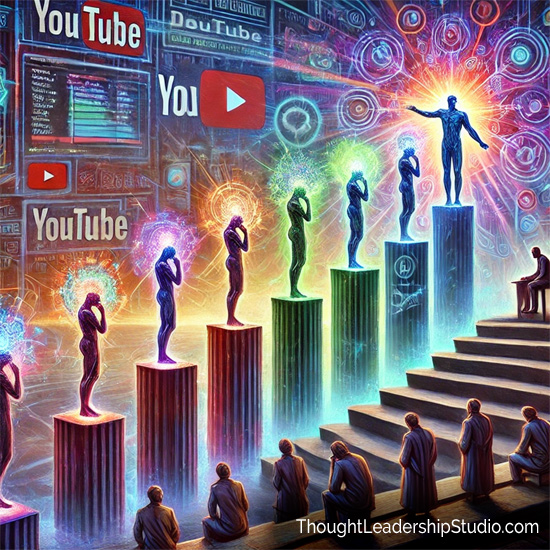 But again, it was ignoring education because education wasn't relevant. It was the skills, it was the abilities. Those were the things that were relevant. Education is only, I think, useful if it provides the skills, the knowledge, the other types of things that you need to do the job. If we're just using education as just some sort of broad screener to say, oh, somebody's smart.
But again, it was ignoring education because education wasn't relevant. It was the skills, it was the abilities. Those were the things that were relevant. Education is only, I think, useful if it provides the skills, the knowledge, the other types of things that you need to do the job. If we're just using education as just some sort of broad screener to say, oh, somebody's smart.
If they have a bachelor's degree, I'm going to say, well, wait a second, I don't know that that's the case. And I can tell you if they're smart enough by just giving them assessment, that really won't take much time.
Chris McNeil: That's awesome.
Mark Smith, PhD: So that was earlier in my career and I would always say I wish other companies maybe more of the white collar side would take that approach where skills are important, knowledge is important, learning is important, but where that stuff comes from, if it comes from college, great. If it comes from somewhere else, great.
We live in the information age and there's as much information on YouTube as there is down the road and the local university, there just is.
Chris McNeil: Yeah, it's crazy. As a musician, I see young guitarists now getting high level skills by watching YouTube videos - we would've had to go to Berkeley School of Music or something like that, or hire a virtuoso instructor back in the day to get this kind of skills.
But that's what you gave is a great example of challenging a prevailing stale mental model with a fresh perspective. That's thought leadership.
Mark Smith, PhD: And it's funny because that was our approach for years and that was my sort of mental model coming at this. And just in the last few years, this skills-based skills first approach to hiring has really taken on more broadly. And then last summer I was, because of my background in assessments and my perspective on this, I was invited to testify to Congress about this type of thing. And this topic, as I say, is really caught on. It's caught the political left and it's caught on the political right.
It was a big hearing and maybe 30 different representatives ask questions of me or somebody else on the panel of the day. And you basically couldn't tell if it was a Republican asking question or if it was a Democrat asking you the question. And I was talking to the staffer who coordinated the whole event afterwards about it, and he said, mark, this never happens. These things are always politically contentious where the left has a completely different perspective than the right here. Everybody is in support of this.
And of course I had said, well, that probably means we should be able to get something done, and of course if we should be able to get something done, it's a topic like this. But of course there are other issues at play where even when everybody agrees, our politicians have a hard time doing things.
Shifting the Paradigm: Moving from Experience-Based Hiring to Skills-First
Chris McNeil: Well, it does speak to the universality of the appeal of the position. So to delineate for the listener a little bit, the Thought Leadership Path, so to speak, if skills first hiring is your Thought Leadership Position, what's the old thinking that somebody would've had without that leadership to that new thinking? And how would you lead them from their old thinking to this position of embracing your model of the skills first hiring?
Mark Smith, PhD: Right. And as I say on the blue collar side, a lot of this was already in place, but it's the white collar side. The office jobs traditionally, even the term qualified, what does it take to be qualified for a job? What people think about is education, and they think about years of experience.
So in order to be qualified for this job, you need a bachelor's degree and you need at least five years of experience doing whatever the topic of the job is. And that was just kind of broadly accepted as well. Of course that's the case. And whenever you hear people talking, just using the term qualified for the job, it was usually education and years of experience.
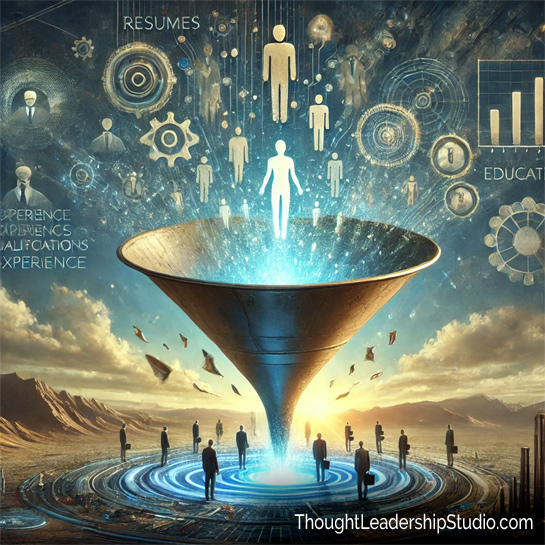 But what does it take to be effective in any job? It's not education, it's knowledge, it's skills. And for so many jobs today, it's learning because maybe what you learned 10 years ago in college was great then, but one you may not remember virtually any of it at this point. And two things have changed, especially if you're dealing with a technical kind of job.
But what does it take to be effective in any job? It's not education, it's knowledge, it's skills. And for so many jobs today, it's learning because maybe what you learned 10 years ago in college was great then, but one you may not remember virtually any of it at this point. And two things have changed, especially if you're dealing with a technical kind of job.
It's like everything you learned in college, the specifics are different now, even if sort of broadly things. And so it's pushing past that traditionally accepted education and experience and moving to something that is more based on knowledge and skills.
Chris McNeil: And part of that is the type of assessments that we were talking about. Can you walk our listener through how that works?
Mark Smith, PhD: So when we think about a hiring process, and I've outlined all this in the book, when you think of the hiring process, often the metaphor that we'll use, the graphic that we'll use will be a funnel. And so you've got a job, you've got a job opening, you need to post it somewhere. So you put together a job posting list of qualifications, the duties of the job.
And then you post that In these days, virtually everybody's posting on Indeed, there are so many jobs on LinkedIn, there's still a number of other different platforms out there. And so they'll post the job and almost immediately they'll start getting a bunch of responses. So then the question is, okay, I'm getting responses to this.
How do I go from a bunch of responses? And when I say a bunch, so many jobs and companies that I'm talking to these days, they'll post the job and two days later they have 300 responses, 300 applicants, 300 resumes of not just random people.
Some of them are just kind of random, but most of them have some reason to believe that they would be a good fit for the job. And so how to manage that number and then get down to something where I can pay attention to each of those individuals.
And so that's the first question is, okay, after I post it, if I get a bunch of responses and a lot of people do, how do I get from that number, which I can't deal with hundreds of people, I just can't deal with individually hundreds of people to a number of people that I can deal with. And that's, I think these days, computerized assessments, hard skills, soft skills, personality knowledge, those things, if you can do a good valid computer assessment can go right at the top of the funnel.
The Human Touch in Hiring: Balancing AI with Realistic Job Previews
Chris McNeil: But then when you get to the bottom of the funnel, that's where that human touch ...
Mark Smith, PhD: And those next steps of the hiring process are going to be interacting with the recruiter, providing more information about the job and the organization. And here it really has to be a realistic job preview, including the bad things about the job. And I say including especially the bad things about the job because at this point, if it's a job that is outside and the temperatures are unpleasant, you need to make sure that the person understands that.
And for some people, they're just like, that's great. I love being outside. And other people are just like, well, that sounds terrible for me. And if it sounds terrible for somebody, I want them exiting the process as soon as possible.
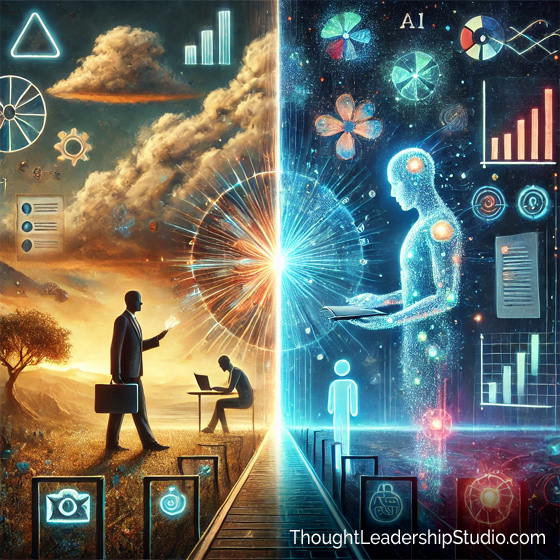 And then after that, okay, there's an honest exchange of this is what the job is like, okay, I'm perfectly fine with that. Then there are going to be some interviews. But you need to get from that a bunch of people to a reasonable number of people to a small number of people who you're actually considering. But if you're only hiring one person, it's how do you get to that one person that you're going to hire from the eight people that you're interviewing or whatever that number is.
And then after that, okay, there's an honest exchange of this is what the job is like, okay, I'm perfectly fine with that. Then there are going to be some interviews. But you need to get from that a bunch of people to a reasonable number of people to a small number of people who you're actually considering. But if you're only hiring one person, it's how do you get to that one person that you're going to hire from the eight people that you're interviewing or whatever that number is.
And that's where I've done some more work recently of helping companies at that top end with the computer assessments, but also at that bottom end when they need to go from three finalists to one hire, how to do that, how to get that information, because that's a different level of information than information earlier in the hiring processes.
And so I've developed some role play assessments that me and some colleagues do for companies where they can say, okay, we've got these final two people. I think they're both great, but I can only hire one. I need more information. And this is where the more information can come from. And so they can pass them on to us, we can run them through a role play. So if it's a manager job, we have a manager role play.
If it's a sales job, we've got a sales role play, and then we can interactively deal with them in kind of this contrived fake situation. But you end up getting a lot of good information about these people, which is a different type of information than interviews or computer assessments. It's a different type of information that I think is really useful at that bottom end.
Chris McNeil: This is good. And this is to contextualize for listener a little bit, and we're talking about HR type stuff, of course, but I think this speaks to kind of a universal need for people that listen to this kind of podcast for thinking of things like AI workflow design, where does it fit in, where does, it doesn't universal for anybody doing leadership on the internet of any sort at this point. So you have to create content and where to support the content.
You don't want it to come off as AI written. You don't want it to be somewhere outside of your own consciousness. So then when you're interviewed, you have no idea what you wrote, so it has to come from you. But AI can sort through mountains of information like long transcripts for instance, and parse out the important parts and help organize. And we talked a little bit about that, about the process of writing your book as well. How of detail, all this information when you write your first book, then how do you get it into a book?
Mark Smith, PhD: Right? There are a lot of resources out there. And once you start going down that AI writing rabbit hole, there are resources where people will basically say, I have an AI system that will write your whole book for you. And you're just like, whoa, wait a second. That sounds like a terrible idea. But there are AI editing and suggestions for alternative ways of saying things, which is just an evolution of the squiggly lines underneath words in Microsoft Word from 15 years ago.
They could catch first they were just catching spelling mistakes where this collection of letters was not found in a dictionary, and so it would give you a squiggly line and then it started catching grammar errors. And that's an evolution where it is different than it was on the very beginning of spellcheck. And then it was, okay, this is a word, but this is not the right version of that word. You have a different version of it there and Word will catch it.
Now, not a hundred percent of the time, but 90% of the time. And so whether you can use Grammarly or something, they can have suggestions for wording. So in the book writing process, there are more resources out there to give you this kind of live feedback. And I found it very helpful. Of course, you can't outsource the writing completely, but there are useful resources available to everybody right now.
***************************************
The transcript is lightly edited for clarity and is a partial transcript- the full interview is on audio. Click here to listen.
***************************************
Free Stuff and Offers Mentioned in Podcast
***************************************
***************************************